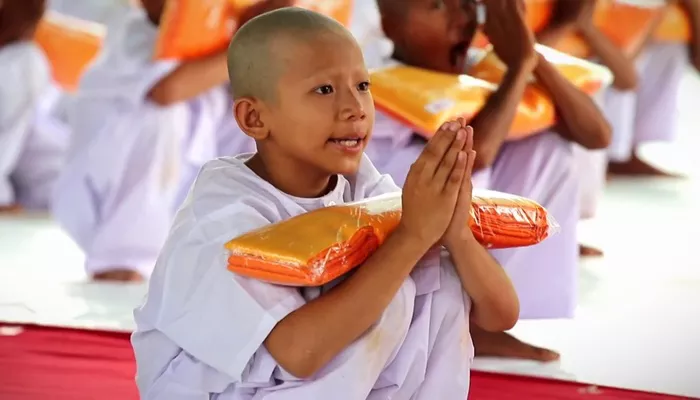Becoming a Buddhist monk is a serious and meaningful decision. It is not just about wearing robes or living in a monastery. The purpose behind this path is deep and life-changing. In simple terms, the main goal of becoming a monk is to follow the teachings of the Buddha and to seek true freedom from suffering.
Who Are Buddhist Monks?
Buddhist monks are people who dedicate their lives to learning, practicing, and teaching the Buddha’s way. They live in monasteries or temples and follow strict rules that help them focus on spiritual growth.
The Core Purpose of Becoming a Buddhist Monk
Seeking Enlightenment
The primary purpose of becoming a Buddhist monk is to reach enlightenment. Enlightenment means fully understanding the truth about life and ending all suffering. The Buddha himself was a monk who found enlightenment and taught others how to achieve it.
Following the Noble Eightfold Path
Monks dedicate themselves to practicing the Noble Eightfold Path. This path guides one to live rightly in thoughts, speech, and actions. It includes right understanding, right intention, right speech, right action, right livelihood, right effort, right mindfulness, and right concentration.
Living a Life of Simplicity and Discipline
Monks live simply to focus on their spiritual goals. They give up worldly desires, like money, possessions, and family ties. This simplicity helps them avoid distractions and develop a calm and clear mind.
The Spiritual Goals Behind Becoming a Monk
Freeing Oneself from Suffering
According to Buddhism, life is full of suffering caused by desire and attachment. Monks work to overcome these through meditation and mindfulness. The purpose is to end the cycle of birth, death, and rebirth, known as samsara.
Helping Others on the Path
Monks also aim to help others find peace and happiness. They teach the Dharma—the Buddha’s teachings—and offer guidance to laypeople. This compassionate service is an important part of their life purpose.
Developing Wisdom and Compassion
Two key qualities monks develop are wisdom and compassion. Wisdom helps see the world as it truly is. Compassion allows monks to care deeply for all living beings. These qualities are necessary for reaching enlightenment.
The Lifestyle of a Buddhist Monk
The buddhist monk lifestyle is very disciplined and focused. Monks wake early, meditate, chant, study scriptures, and follow strict daily routines. Their day is designed to support their spiritual growth.
Daily Routine
Monks usually wake up before sunrise to begin meditation. They eat simple meals, often only once or twice a day, depending on their tradition. After meals, they study Buddhist texts and teach others. They spend time in meditation to calm the mind and gain insight.
Living with Rules
Monks follow the Vinaya, a set of rules created by the Buddha. These rules guide their behavior, speech, and relationships. For example, monks avoid harming any living beings and do not handle money. This helps maintain purity and focus on spiritual life.
The Symbolism of the Monk’s Robes
The buddhism monks outfit is more than clothing; it symbolizes the monk’s commitment to the path. The robes remind monks of simplicity, humility, and detachment from material life.
Colors and Meaning
Different Buddhist traditions use different colors for robes. Usually, colors like saffron, orange, or brown are chosen because they represent renunciation and purity. Wearing these robes also shows a monk’s role in the community as a spiritual guide.
Practical Function
The robes serve practical purposes too. They are easy to wash, simple to wear, and help monks stand out as people who have chosen a special path in life.
Why Some People Choose to Become Buddhist Monks
Desire for Spiritual Growth
Many people feel that worldly life is full of suffering and distractions. They want to find deeper meaning and peace. Becoming a monk offers a way to focus entirely on spiritual practice and growth.
Inspiration from the Buddha and the Sangha
The Buddha’s example and the community of monks (Sangha) inspire many to take the monastic path. Living among other monks who share the same goals can support personal transformation.
Service to Others
Some choose monkhood to serve their community. They teach meditation, offer rituals, and provide moral guidance. This service is seen as a way to cultivate compassion and help reduce suffering in society.
Challenges in Becoming a Buddhist Monk
Letting Go of Attachments
One of the hardest parts of becoming a monk is giving up attachments. This can include family, career, and possessions. It requires strong will and deep faith in the path.
Living Under Strict Rules
Monks must follow many rules, which can be difficult for some. This discipline is necessary to support their spiritual aims but takes time to adjust to.
Facing Social and Personal Changes
Choosing monkhood can change how others see you. Friends and family might not understand the choice. Monks must be prepared to live with these changes peacefully.
The Long-Term Benefits of Being a Monk
Inner Peace and Freedom
Many monks report feeling deep inner peace as they progress on the path. They gain freedom from fear, anger, and suffering.
Clarity and Wisdom
Years of meditation and study help monks see life clearly. This wisdom benefits both themselves and those they teach.
Community Respect and Spiritual Support
Monks often become respected members of their communities. They receive support and gratitude from people who value their guidance and example.
Conclusion
In summary, the purpose of becoming a Buddhist monk is to follow the Buddha’s path fully. It means seeking enlightenment, freeing oneself from suffering, and serving others with compassion. It is a life of discipline, simplicity, and deep spiritual practice. Through this path, monks aim to find true happiness and help others find it too.

